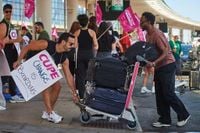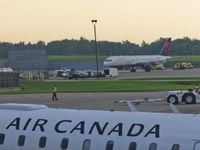Air Canada’s summer travel season has been thrown into turmoil as a strike by 10,000 of its flight attendants entered its fourth day, defying back-to-work orders from the federal government and the Canada Industrial Relations Board. The walkout, which began in the early hours of August 16, 2025, has grounded hundreds of flights, left tens of thousands of passengers stranded, and exposed deep divisions over fair pay, working conditions, and the future of labor relations in Canada’s private sector.
As reported by CTV News and corroborated by The Canadian Press, the strike—now declared illegal by the Canada Industrial Relations Board—continues to affect roughly 130,000 travelers each day at the peak of the country’s busy summer travel period. Air Canada, the nation’s largest airline, typically operates around 700 flights daily, but has estimated that 50,000 customers would be directly disrupted by the ongoing work stoppage. The airline announced that all flights, including those operated by Air Canada Rouge, would remain suspended through at least 4 p.m. Eastern Time on August 19, leaving many passengers in limbo.
Passengers like John and Lois Alderman, stranded at Toronto Pearson International Airport, are feeling the brunt of the dispute. "I'm a diabetic and I'm going to run out of insulin in about four days," John told CTV News—a stark reminder that the consequences of the strike extend far beyond missed vacations or business appointments.
The strike erupted after flight attendants, represented by the Canadian Union of Public Employees (CUPE), rejected Air Canada’s request to enter government-directed arbitration. The airline’s latest offer included a 38% increase in total compensation over four years, with an 8% raise in the first year. However, the union has argued that the proposed raise does not keep pace with inflation and fails to address the longstanding issue of unpaid work performed by flight attendants when planes are not in the air. CUPE is demanding higher raises and full compensation for all duties, including ground work, which the airline has thus far proposed to pay at only 50% of the regular hourly rate.
CUPE’s defiance of the back-to-work order is not without precedent, but it is increasingly rare in Canada’s current labor landscape. "If Air Canada thinks that planes will be flying this afternoon they are sorely mistaken. That won't be happening today," Mark Hancock, national president for CUPE, told CTV News. He added, "We will not be returning to the skies. If it means folks like me going to jail than so be it. If it means our union being fined than so be it. We're looking for a solution here. Our members want a solution here but solution has to be found at the bargaining table."
Air Canada’s leadership, meanwhile, insists that a return to work is necessary for negotiations to move forward. Chief Operating Officer Mark Nasr told The Canadian Press, "The airline is ready to work on an industry-leading deal but can't do that while planes are grounded." CEO Michael Rousseau echoed this sentiment, stating on BNN Bloomberg, "We're obviously hoping we can go tomorrow, but we'll make that decision later today."
The federal government has responded by invoking Section 107 of the Canada Labour Code, a rarely used provision that allows the government to order binding arbitration and force employees back to work in the event of a labor dispute that threatens public welfare. Jobs Minister Patty Hajdu announced a federal probe into allegations of unpaid work for flight attendants, telling The Canadian Press that such claims are "deeply disturbing" and promising her department would close any loopholes if they exist.
The government’s intervention has drawn sharp criticism from labor leaders and unions across the country. The Public Service Alliance of Canada declared solidarity with the striking flight attendants and demanded the government "immediately" rescind the order invoking Section 107. CUPE itself has condemned the move as an attack on workers’ rights, accusing Ottawa of "crushing flight attendants’ Charter rights." The union is now challenging the back-to-work order in Federal Court, further escalating the standoff.
Prime Minister Mark Carney, facing his first major labor crisis since taking office, has urged both parties to resolve the dispute quickly. "We are in a situation where literally hundreds of thousands of Canadians and visitors to our country are being disrupted by this action," Carney said, as reported by CTV News. He emphasized the importance of fair compensation for flight attendants but expressed disappointment that negotiations had not yet yielded a deal.
Beyond the immediate travel chaos, the strike has become a flashpoint for broader debates about labor rights, gender equity, and the value of service work in Canada. The vast majority of Air Canada’s flight attendants are women—about 70%, according to union sources—and their fight for better pay and working conditions highlights the persistent gender wage gap in the country. In 2024, Air Canada’s pilots, a workforce largely composed of men, secured a 26% wage increase in the first year of their new contract and a 42% overall boost. Flight attendants, by contrast, have been offered significantly less, despite performing work that is physically demanding and emotionally taxing.
"Air Canada’s male-dominated workforce received a significant cost-of-living wage increase. Why not the flight attendants, who are 70 per cent women?" Natasha Stea, president of the CUPE division representing Air Canada flight attendants, asked in an August 15 union statement. The union argues that the undervaluing of flight attendants’ work is part of a broader pattern seen in other female-dominated sectors—caring, clerical, catering, cashiering, and cleaning—where jobs tend to be precarious and underpaid.
The strike has also reignited debate over the federal government’s increasing reliance on back-to-work legislation to resolve labor disputes, a trend that began in earnest under Stephen Harper’s Conservative government and has accelerated in recent years. Section 107 of the Canada Labour Code, first enacted in 1984, was rarely used until recently, but has now been invoked to end work stoppages at ports, rail yards, and Canada Post. Critics warn that this approach undermines the right to free and fair collective bargaining and could dampen the momentum for labor organizing that has surged in Canada since the COVID-19 pandemic.
On the picket lines, solidarity remains strong. At Vancouver International Airport on August 18, Air Canada employees were seen chanting, "hey, hey Rousseau, unpaid work has got to go," while passing cars honked in support. The union says negotiations with Air Canada resumed on the evening of August 18, with mediator William Kaplan joining talks in Toronto. But as of Tuesday morning, the strike remains firmly in place, with both sides entrenched and the outcome uncertain.
As travelers, workers, and government officials alike wait for a breakthrough, the Air Canada strike stands as a high-stakes test for labor relations in Canada—one that could shape the rights and expectations of workers for years to come.


